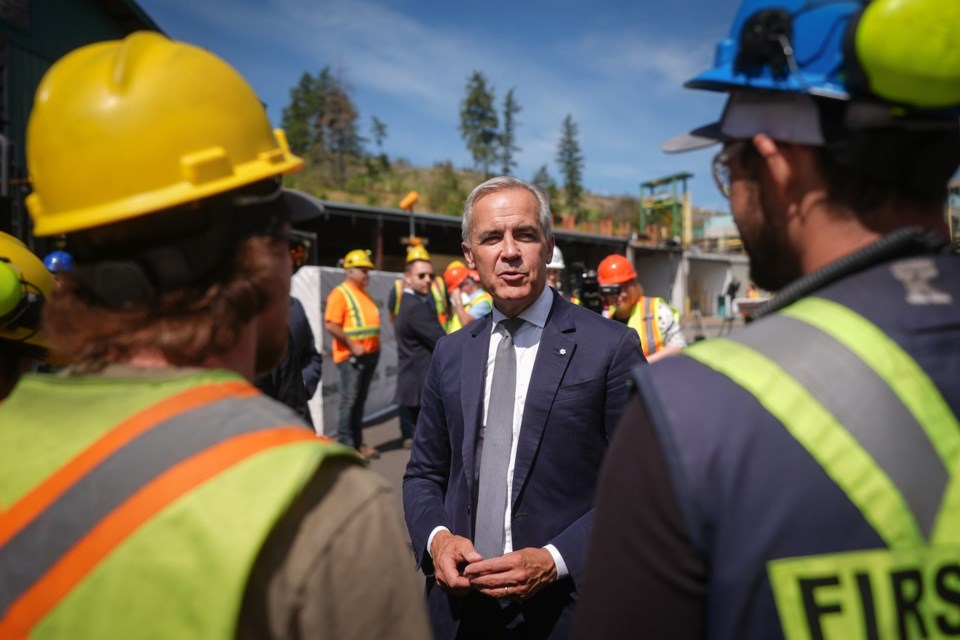KELOWNA — The federal government is setting up a safety net of loans, product-development grants and market diversification plans for Canada’s softwood lumber industry in an effort to shield it from the worst of American duties and fees.
Prime Minister Mark Carney announced the plan Tuesday, promising $700 million in loan guarantees to address what he called "immediate pressures" and $500 million for long-term supports to help companies diversify export markets and develop their products.
Carney also promised that future projects will "prioritize" Canadian lumber.
"We will be our own best customer by relying more on Canadian lumber, Canadian softwood for Canadian projects," he said.
The announcement comes amid heightened trade tensions with the United States over softwood lumber, a decades-long friction point in the Canada-U.S. trade relationship.
The U.S. Commerce Department recently announced it intends to hike anti-dumping duties on Canadian softwood to just over 20 per cent. In addition to the countervailing duties, the fees would be closed to 35 per cent.
Carney said his government has a mandate to "get big things," like millions of new homes, major new ports, trade corridors and energy projects "built faster."
The prime minister said government is working toward doubling the pace of new home building to almost 500,000 homes a year over the next decade.
"That alone could double the use of Canadian softwood lumber in new residential construction, an increase of almost two billion board feet, and double demand for structural panels, an increase of nearly one billion square feet," he said.
He added that this fall it will launch Build Canada Homes program to get the government back into the "business of building deeply affordable homes."
He said the government will also introduce a training program as well for "up-skilling and re-skilling" workers, which will include $50 million for those in the forestry sector.
Carney announced the measures in West Kelowna at the Gorman Bros Lumber mill, which he had toured earlier with Nick Arkle, CEO of the Gorman Group.
Arkle welcomed the support in an interview after Carney's appearance.
"I have not seen the federal government show this kind of attention to the forest industry," Arkle said.
This attention, combined with the attention from the provincial government, is significant, he added.
Arkle also acknowledged that the industry has to do its part.
"What we need to show is that we are responding," he said, adding the industry needs to diversify its markets and its products.
B.C.'s Forest Minister Ravi Parmar said the announcement sends a "strong signal" that Ottawa has recognized the "foundational nature" of the softwood lumber industry.
"The federal government has certainly stepped up," he said.
B.C. will now be asking for its "fair share" of the funding, somewhere between 40 and 50 per cent given the size of the provincial softwood lumber industry, Parmar said.
The announced measures will also help in reaching a trade deal with the United States that won't leave softwood lumber out.
"This support buys us some time to do this important work," he said.
Kurt Niquidet, president of the B.C. Lumber Trade Council, said in a statement that the measures are "timely" because the industry needs support now.
Kim Haakstad, president of the Council of Forest Industries, said the measures provide "critical relief" during an "exceptionally challenging time."
Both Niquidet and Haakstad pointed to the importance of resolving the softwood lumber dispute, with both calling on Carney to make it a top priority in trade negotiations.
The fate of the softwood lumber industry is in particular importance in B.C., where Premier David Eby has repeatedly called on Ottawa to link resolution of the softwood lumber dispute to a larger trade deal and to treat the industry with the same importance as Ontario's auto industry.
Carney said Canada has consistently raised the issue with the United States, adding that resolving the trade dispute and the softwood lumber dispute are "distinct but related" when it comes to American protectionism.
"So to be clear — we are not sacrificing any industry," he said. "We are working for the best deals for all our industries."
Arkle acknowledged that the possibility of softwood lumber being left behind has been a "major concern" in the past, saying "all of the attention" seems to be on Ontario.
"We will hold government accountable if they sacrifice us," he said. "They haven't sent out any indication that that is going to happen, and I take them at face value," Arkle said.
Speaking in front of some 100 workers who were wearing hard hats and safety vests, Carney struck a defiant note.
"At this hinge moment in history, Canada is starting to shift from reliance to resilience," Carney said. "Together, we are going to write our own story, rather than let others dictate theirs to us.
Federal Minister of Energy and Natural Resources Tim Hodgson, who represents an Ontario riding, and Kelowna MP Stephen Fuhr, who also serves as secretary of state for defence procurement, joined Carney on the tour of the facility, which is in the riding of Conservative MP Dan Albas.
Following the announcement, Carney shook hands with the workers and joined Hodgson and Fuhr in signing their names on hard hats as souvenirs of their visit.
West Kelowna was Carney's last stop on his B.C. swing, where he walked in Vancouver's Pride parade and stopped in Nanoose Bay on Vancouver Island.
This report by The Canadian Press was first published Aug. 5, 2025.
Wolfgang Depner, The Canadian Press



